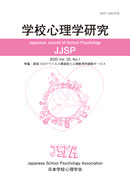Volume 20, Issue 1
Displaying 1-13 of 13 articles from this issue
- |<
- <
- 1
- >
- >|
-
2020Volume 20Issue 1 Pages 1
Published: December 31, 2020
Released on J-STAGE: April 08, 2021
Download PDF (118K)
-
2020Volume 20Issue 1 Pages 3-11
Published: December 31, 2020
Released on J-STAGE: April 08, 2021
Download PDF (281K) -
2020Volume 20Issue 1 Pages 13-19
Published: December 31, 2020
Released on J-STAGE: April 08, 2021
Download PDF (644K) -
2020Volume 20Issue 1 Pages 21-26
Published: December 31, 2020
Released on J-STAGE: April 08, 2021
Download PDF (245K) -
2020Volume 20Issue 1 Pages 27-33
Published: December 31, 2020
Released on J-STAGE: April 08, 2021
Download PDF (497K) -
2020Volume 20Issue 1 Pages 35-40
Published: December 31, 2020
Released on J-STAGE: April 08, 2021
Download PDF (287K) -
2020Volume 20Issue 1 Pages 41-45
Published: December 31, 2020
Released on J-STAGE: April 08, 2021
Download PDF (273K) -
2020Volume 20Issue 1 Pages 47-54
Published: December 31, 2020
Released on J-STAGE: April 08, 2021
Download PDF (395K) -
2020Volume 20Issue 1 Pages 55-61
Published: December 31, 2020
Released on J-STAGE: April 08, 2021
Download PDF (264K)
-
2020Volume 20Issue 1 Pages 63-70
Published: December 31, 2020
Released on J-STAGE: April 08, 2021
Download PDF (335K) -
2020Volume 20Issue 1 Pages 71-76
Published: December 31, 2020
Released on J-STAGE: April 08, 2021
Download PDF (262K)
-
2020Volume 20Issue 1 Pages 77-80
Published: December 31, 2020
Released on J-STAGE: April 08, 2021
Download PDF (655K)
-
2020Volume 20Issue 1 Pages 81-84
Published: December 31, 2020
Released on J-STAGE: April 08, 2021
Download PDF (201K)
- |<
- <
- 1
- >
- >|
